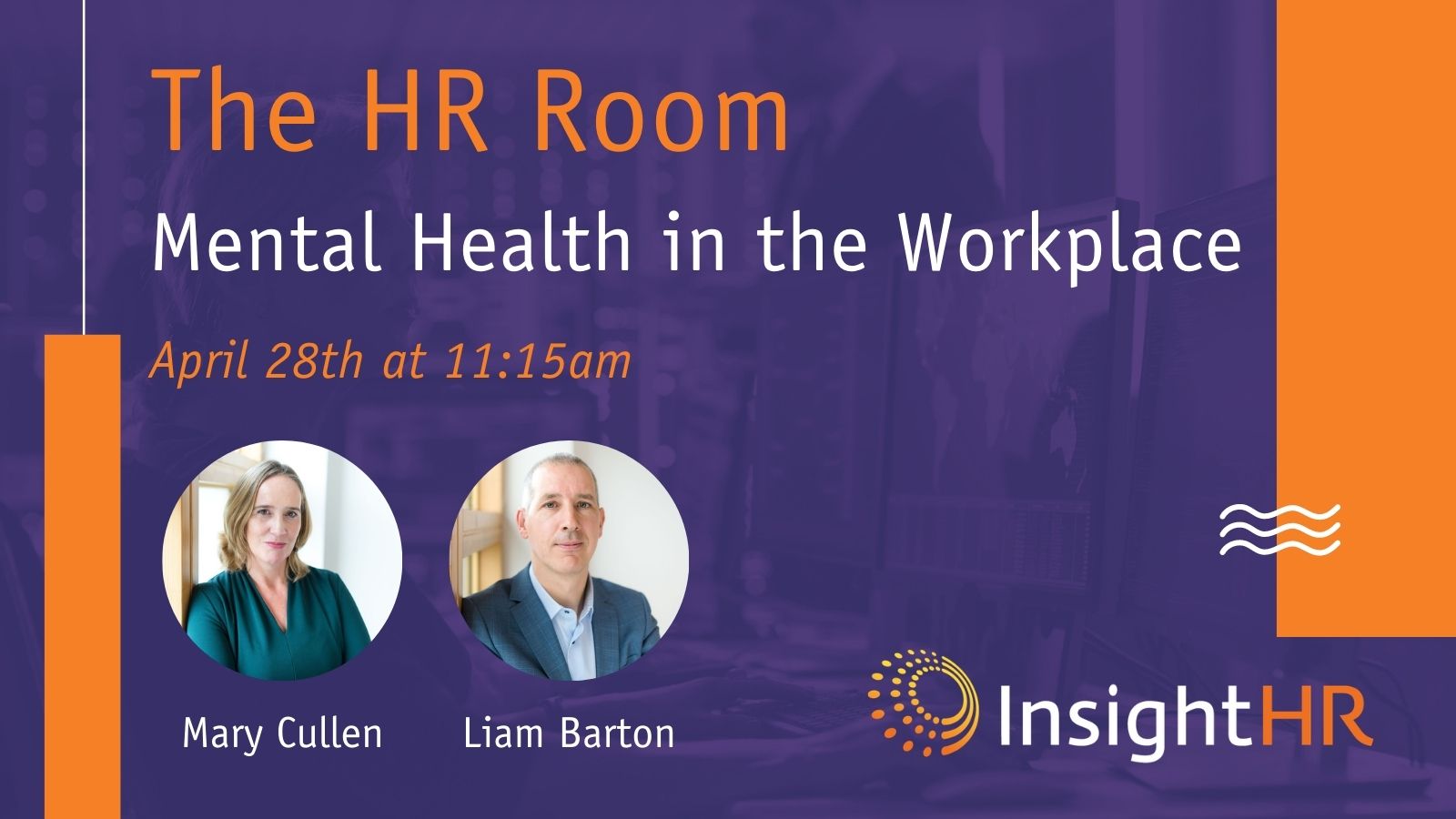Mental health in the workplace has become a cause for concern for employers right across the globe. Covid-19 has presented many challenges for employees, who have either been isolated from their colleagues or have had to deal with increased pressure on the front line. Home lives have been affected as the humble abode has become at times an office, at times a school, somewhere from which to tune into funerals or weddings, as well as the place we should be able to unwind and relax in. There are no holidays in the sun to look forward to nor any restaurants or pubs open for socialising. On top of this, employees also have the constant fear and worry of contracting Covid or inadvertently passing it on to a loved one. It’s a difficult time for everyone.
Even before the pandemic, Ireland was reported as having “one of the highest rates of mental health illness in Europe”. Joint third, in fact. Mentalhealthireland.ie states that one in four of us will experience a mental health problem at some point in our lives – a figure which somehow seems at once incredible yet conservative, considering how many reports of mental health issues we are seeing, especially from within the workplace. What are some of the causes of these problems?

Are you putting too much pressure on your employees?
High-risk sectors
The pandemic has certainly placed new levels of stress and anxiety on employees, and perhaps none so much as healthcare workers. This group of employees have not only been on the front line throughout the pandemic, but have also been experiencing disproportionately high numbers of infections, estimated to amount to around 10% of total cases. According to recent research, there is also a high rate in the number of reported cases of anxiety and stress among healthcare workers, and even evidence of longer-term issues such as PTSD and adjustment disorders.
Of course, mental health is not just a discussion for pandemic times, and it is not just healthcare workers who experience the strain. Within the legal profession, a massive 57% of solicitors have reported “very high or extreme levels of stress” (Legal-island.ie, 2020). Factors cited include high client expectations, tight deadlines and large workloads – all issues which are not exclusive to the legal profession. However, when combined with the fact that most solicitors face distressing situations daily (especially those working in family law and criminal law), the likelihood of these pressures creating a toxic work environment increases.
Role hierarchy can also affect a person’s wellbeing. A survey conducted by Ipsos Mori recently found that 27% of managers had had a mental health diagnosis.
Part of the reason for this mental health crisis could be due to our seeming inability to talk about some of the pressures we experience in the workplace. Of the 27% of managers with diagnosed mental health issues, only 18% had told their employer about it. Considering that managers are looked to as leaders and are encouraged to set an example for their direct reports, this statistic is scary in more ways than one. We all know that talking things through can sometimes help to alleviate symptoms of stress and anxiety. An inability to do this, for whatever reason, can mean that these symptoms can become compounded and lead to an eventual breakdown, a physical manifestation of the stress experienced.
Given that the average adult will spend approximately one third of their life working, emphasis needs to be put on identifying potential stressors which can have an impact on employee wellbeing. Section 8 (1) of The Safety, Health and Welfare at Work Act 2005 states that “every employer must protect, so far as is reasonably practicable, the safety, health and welfare at work of its employees”. This begs the question, how is an employer supposed to help employees if they are never told there is a problem? The answer to that lies with another question – why are those employees not comfortable disclosing such details? If your organisation promotes a culture of stigma around these issues, no matter how noble your intentions may be, employees will be discouraged from confiding in those within your organisation that could potentially offer help and support.
So, what are some steps that you can take to proactively tackle this area?
Providing a safe place of work
A healthy and productive workforce is important to the running of a successful organisation, and every business has a duty of care towards its employees. In pre-pandemic times, this often meant that organisations would focus on employee wellbeing from a physical point of view, incorporating exercise classes and healthy eating initiatives. Of course, while research has proven that a good diet and exercise can also contribute to mental wellbeing, these steps should not be taken in isolation.
In these current times however, a safe place of work means so much more. Aside from ensuring that front-line workers have access to sanitiser, masks, and other forms of personal protective gear, employers really need to be looking at ways to safeguard the mental health of their employees. Employees providing an essential service, from nurses through to supermarket workers, are likely experiencing increased levels of stress as they deal with equally stressed members of the public. It is therefore important that these employees have somewhere they can go to take a break when they need it and that employers are making sure health and safety guidelines are being followed – by both employees and the public. Read our recent blog which goes into further detail on this subject.
Of course, there is also the large proportion of Irish workers who are currently working from their homes. While providing office chairs, desks, laptop stands etc. is likely something that many businesses have already considered or done, the nature of many people’s home lives may mean that office spaces are constantly changing. What was adequate in 2020 may no longer be enough for employees now, and HR should really be checking in regularly to see are there any adjustments which need to be made.
Ensuring that ways of working do not place undue stress on employees.
Today’s working environment is aided by technological innovations which can make employees more efficient and able to complete working tasks in less time than ever before. Such innovations can contribute to a more flexible style of working which can also have positive results for both employers and staff. After all, for many businesses over the last year, technology has been the difference in remaining viable and shutting down. But where lines are blurred between work and home life it can be hard to escape the stressors that work can bring – something which we are all too acutely aware of thanks to Covid.
Covid has also made it more difficult for us to socialise with one another. This can have a major effect on remote teams. For extroverted employees, not having the usual chit-chat and office banter with one another has been one of the hardest things to get used to when working from home. Meanwhile, introverted employees may not be enjoying having to attend online meetings – which research has shown can lead to Zoom fatigue as it is harder to read visual cues and body language.
Of course, there are also major issues which stem from pressure to meet either internal or external deadlines. In a lot of organisations, this can lead to employees needing to work more hours than is in their contract of employment, very often without any extra pay or benefits. Employers should really scrutinise what their culture here is. In some cases, such circumstances are unavoidable, especially in reactionary situations (for instance a care worker needing to work for longer than their scheduled hours in order to deal with a matter adequately). However, adjustments may need to be made regarding that employees’ other duties in order to avoid undue stress and anxiety.
In 2018, the Labour Court awarded €7,500 to an employee who was found to have been working more than the maximum allowed number of hours per week, due to the number of work-related emails she was required to review and send as part of her role. By failing to put a stop to this, the employer was found to be in breach of the law and was therefore liable. If your place of work has an unspoken expectation that employees be contactable at all times, you may find yourself in a similar situation. Rather, every employee should have the right to delineate between working hours and personal hours and you as an employer should be supportive of this.
At the beginning of April, the Tánaiste signed a new code of practice giving all employees the Right to Disconnect. Although not following the code is not an offense in itself, it is admissible in evidence in any court proceeding or matters before the WRC. Employers should therefore be very aware of this and consider the benefit of applying the new code of practice in the workplace.
Prevention of bullying and harassment
Employers can never, with 100% certainty, fully prevent employees from treating other employees in a way that could give rise to complaints of bullying or harassment. There is however an expectation that an employer can identify potentially volatile working relationships and act before it becomes an issue. In the recent case of McCarthy vs ISS Ireland, the plaintiff alleged that she had reported several incidents of bullying to ISS Ireland who had failed to take action. The Court of Appeal found that ISS Ireland was liable in neglecting to take precautionary steps to prevent the recurrence of a situation which resulted in significant stress for the plaintiff. As an employer, you must ensure that reports of bullying and harassment are dealt with according to procedure – and that such procedures exist and have been communicated to staff.
Remember too that working from home does not eradicate the threat of bullying. In fact, the recently published WRC/HSA Joint Code of Practice on the Prevention and resolution of Bullying at Work 2021 outlines that “bullying activities involve actions and behavioural patterns, directly or indirectly, spoken and/or written and could include the use of cyber or digital means for the goal of bullying”.
Open lines of communication
Organisations should operate a transparent and open working environment so that employees feel able to talk about their experiences with mental health. If an employee reports that they are feeling overworked or under pressure, their complaint needs to be dealt with confidentially and satisfactorily, without any fear of repercussions. The HR function within your organisation should be a beacon of light for employees who feel that they are all at sea. However, HR professionals are human too! Just as solicitors often have to deal with distressing situations which can cause stress, so too do HR professionals. When taking a flight, the air stewards always advise during the safety instructions that, were the plane to get into difficulty, parents travelling with children should put on their own oxygen masks first before attempting to sort out their child’s. In the same vein, HR professionals should ensure that they are prioritising their own health in order to be best equipped to perform their role adequately.
HR professionals must also recognise areas where they are not equipped with the necessary skills to help an employee. In some cases, an employee may benefit from speaking to a professional counsellor or therapist that can help them find the light at the end of the tunnel. Incorporating access to counselling into an Employee Assistance Programme may be advisable, especially in high-risk sectors and especially during the current pandemic.
No matter how transparent and open you aim to make these lines of communication, sometimes an employee may just not feel able to come forward and speak to management about the issues they are having. If you suspect that an employee may be experiencing some problems in this area, then as a manager you should proactively approach the situation. It may be adequate to have an informal chat with the employee and try to find out whether there has been anything that has happened in their personal life recently which could be affecting them at work, whether their tasks are placing an inordinate amount of stress of them or whether they are struggling due to any of the myriad of knock-on effects the Covid crisis has brought with it. In such situations, it is also your responsibility to provide them with any information which you feel may be relevant to them, such as where they can go to for advice on their specific situation, contact details for counsellors and online resources.
The right to privacy
In a lot of cases, matters can and should be dealt with in confidentiality. Any manager found to be in breach of confidentiality should face serious consequences, as such a breach can dissuade employees coming forward in the future.
It is worth noting though that this agreement to keep things confidential should never cloud your better judgement. It is always your utmost priority to ensure the health and safety of all employees. That means that if an employee is deemed to be a risk either to themselves or to others, it may be necessary for you enlist an external party to help deal with the situation and prevent any harm coming to those involved.
What happens if the employee is no longer well enough to do their job?
Most employers are aware that they must tread carefully when it comes to sensitive issues, such as an employee’s health determining how able they are to fulfil their role. As the Employment Equality Acts 1998-2015 state, an employer cannot simply dismiss an employee who is deemed no longer capable without first properly assessing the situation and taking any reasonable steps possible to accommodate their needs and enable them to fulfil that role. A mere feeling that a recent illness or accident will be an impediment to their ability to fulfil the required duties is not valid enough reason. Instead, there is a set process that employers must follow in order to prove that they have complied with the law, otherwise they could be at risk of legal action.
Where can I find further advice?
When it comes to developing policies which will help you to deal with mental health issues in the workplace, organisation such as Pieta House, Aware and Mental Health Ireland offer a wealth of online resources and supports. You can also access training programmes which are geared towards helping both employees and managers recognise the symptoms of mental health issues, as well as offer guidance in how to address matters appropriately and effectively.
In the meantime, should you need any help in the area of developing policies, procedures or indeed any HR related issue, please do give us a call on 056-770100



